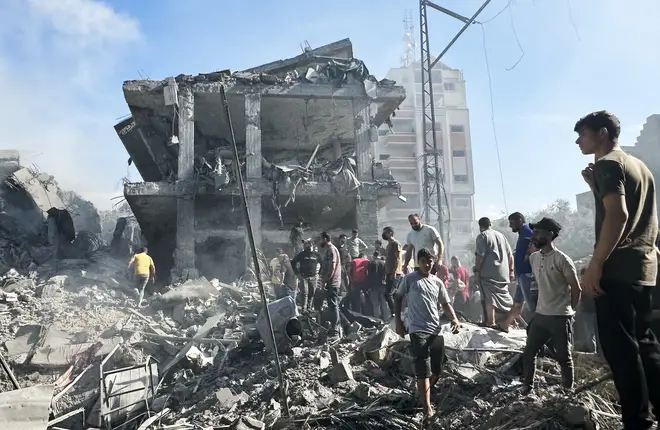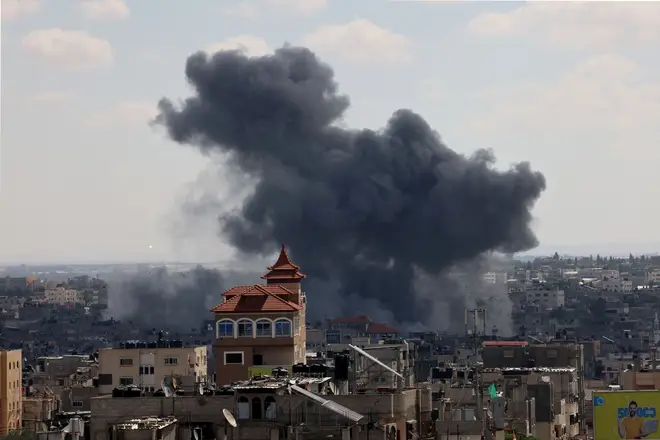
Shelagh Fogarty 1pm - 4pm
17 October 2023, 18:00 | Updated: 17 October 2023, 18:10

At least six people have been killed when a school was hit during air strikes in the al-Maghazi refugee camp in the Gaza Strip, the UN says.
Dozens of other people have been injured.
Thousands of people had been taking refuge at the site during Israeli air strikes.
UN agency UNRWA posted online: “This is outrageous & it again shows a flagrant disregard for the lives of civilians.”
The school is run by the United Nations’ Palestinian refugee agency (UNRWA) in the refugee camp. The number of civilians killed in Gaza continues to climb. At least 940 children and 1,032 women have been killed in Gaza since October 7 when Israel launched its retaliatory attack following an invasion by Hamas.
Read more: UK terror threat level 'highly likely' to be raised by Israel-Hamas war
Israeli air strikes continued to pound Gaza today, even inside the evacuation zone where Israel had told residents to gather in advance of an expected ground offensive.

Israel appears set to mount a major assault on the northern part of the territory aimed at rooting out Hamas.
Wounded people were rushed to hospital after heavy attacks outside the southern Gaza cities of Rafah and Khan Younis, Gaza residents reported.
Basem Naim, a senior Hamas official and former health minister, reported that 27 people were killed in Rafah and 30 were killed in Khan Younis.
Israel has carried out unrelenting strikes against Hamas-ruled Gaza since the militant attack on southern Israel last week killed 1,400 people, mostly civilians.
Dozens of Israelis and citizens of other countries were taken captive and brought to Gaza by militants.
The Israeli strikes have killed at least 2,778 people and wounded 9,700 others in Gaza, according to the Health Ministry there. The strikes have not stopped Hamas militants from continuing to attack Israel with rockets launched from Gaza.
The combination of air strikes, dwindling necessities caused by Israel's blockade, and Israel's mass evacuation order for the north of the Gaza Strip has thrown the tiny territory's 2.3 million people into upheaval and caused increasing desperation.
More than 1 million Palestinians have fled their homes, and 60% are now in the approximately eight-mile area south of the evacuation zone, the UN said. Aid workers warned that the territory was near complete collapse with ever-decreasing supplies of water and medicine and with power running out at hospitals.
At the Rafah crossing, Gaza's only connection to Egypt, truckloads of aid were waiting to go into the tiny, densely populated territory, and trapped civilians - many of them Palestinians with dual nationalities - were hoping desperately to get out.
Mr Biden will also travel to Jordan to meet Arab leaders amid fears the fighting could expand into a broader regional conflict as fighting intensified along Israel's border with Lebanon.
US Secretary of State Antony Blinken, who visited Israel for the second time in a week on Monday after a six-country tour through Arab nations, said in Tel Aviv that the US and Israel had agreed to develop a plan to enable humanitarian aid to reach civilians in Gaza.
There were few details, but the plan would include "the possibility of creating areas to help keep civilians out of harm's way", he said.
In Gaza, hospitals were on the verge of losing electricity, threatening the lives of thousands of patients, and hundreds of thousands of Palestinians displaced from their homes searched for bread.
With taps dry, many rationed the little clean water available and others resorted to drinking dirty or sewage-filled water, risking the spread of disease.
The Israeli military said it was trying to clear civilians for their safety ahead of a major campaign against Hamas in Gaza's north, where it says the militants have extensive networks of tunnels and rocket launchers. Much of Hamas' military infrastructure is in residential areas.
Israel evacuated towns near its northern border with Lebanon, where the military has exchanged fire repeatedly with the Iranian-backed Hezbollah group.
Israel fought a vicious month-long war with Hezbollah in 2006 that ended in a stalemate and a tense detente between the two sides.
Speaking to the Israeli Knesset, Prime Minister Benjamin Netanyahu warned Iran and Hezbollah: "Don't test us in the north. Don't make the mistake of the past. Today, the price you will pay will be far heavier."
Soon after he spoke, the Knesset floor was evacuated as rockets headed toward Jerusalem. Sirens in Tel Aviv prompted US and Israeli officials to take shelter in a bunker, officials said.